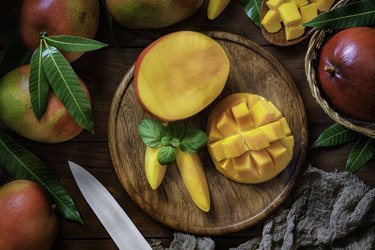
As the so-called "king" of fruit, mangoes provide copious amounts of vitamin C and potassium, among other nutrients.
Mangoes are also known to prevent constipation but they do have a high sugar content relative to many other fruits, says Amanda Beaver, RDN, LD, a wellness dietitian with Houston Methodist Wellness Services. That means they can spike blood sugar faster than, say, strawberries, oranges and blackberries.
Video of the Day
Video of the Day
Take a look at how mangoes can affect your digestion, from the benefits to some less-desirable side effects.
1. They Add Digestion-Friendly Fiber
One cup of mango has 2.64 grams of fiber, per the USDA. The fruit is actually lower in fiber than many fruits because much of the fiber is in the skin and mangoes are usually peeled before it's eaten, says Isabel Maples, RDN, a national spokesperson for the Academy of Nutrition and Dietetics.
Mangoes contain both soluble and insoluble fiber:
- Soluble fiber dissolves in water, creating a gel-like substance that feeds the "good" bacteria in our large intestine (colon). "Providing fuel for the beneficial bacteria in our gut is a good thing because these gut bacteria can have anti-inflammatory effects," Beaver says. Among other things, this can help lower cholesterol and balance blood sugars.
- Insoluble fiber, which does not dissolve in water, adds roughage and speeds up the pace at which our stools move through our bodies, Beaver says.
Both types of fiber are vital in aiding digestion. Plus, like many other fruits, mangoes also contain polyphenols, a group of compounds with antioxidant properties that may help fend off diabetes and other chronic diseases. Polyphenols also provide fuel for our gut microbiome.
2. Mangoes May Cause Gas and Bloating
But while fiber can aid digestion, mangoes are also particularly high in two types of sugar — sucrose and fructose — that can cause gas and bloating once they're broken down in our gut.
Sucrose is broken down into fructose, a simple sugar, by digestive enzymes called amylases. "Ripe and overripe mangoes are sweeter because this enzyme, naturally found in mango fruit, turns starch into sugar as the fruit ripens," Maples says.
Fructose is a type of fermentable carbohydrate, Beaver says. "When the mango reaches our lower gastrointestinal tract [the large intestine or colon], bacteria begin to break down the fermentable carbohydrates and fiber and produce gas as a byproduct," she says.
Our bodies can only absorb so much fructose. Any extra travels to the large intestine where bacteria gorge, leading to gas and bloating. That build-up of gas and the distended belly can lead to abdominal pain, too.
Both gas and bloating can be particularly pronounced in people with irritable bowel syndrome (IBS) who eat mangoes (and various other fruits).
How to Reduce the Risk of Gas
There are ways to reduce the risk of gas and its associated complications — here are some strategies, per the Mayo Clinic:
- Identify and cut back on foods that contribute to gas. This may include beans, legumes, broccoli, foods containing lactose and carbonated drinks as well as certain fruits. If you notice mangoes make you gassy, consider avoiding them or eating only a small portion.
- Reduce how much fatty food you eat. Because fats are slow to digest, this allows more time for fermentation which in turn leads to gas.
- Use an over-the-counter anti-gas product. Think: Lactaid (which helps if you can't digest lactose), Beano (which helps digest gasses found in beans, per the Mayo Clinic), or other options found in drugstores.
And, if you're already experiencing the unpleasant, uncomfortable symptoms, try these natural remedies for gas.
3. Mangoes May Relieve Constipation
Mangoes may not be a good for an upset stomach but they do have laxatives properties. That can be helpful if you're blocked up.
Consuming 300 grams of mangoes (about two cups or one mango) over four weeks was better than an equivalent amount of fiber (in supplement form) in combatting chronic constipation, producing softer poop more often, per a 2018 pilot study published in Molecular Nutrition & Food Research.
Study participants who ate mango regularly also produced more short chain fatty acids, an indication that "good" intestinal bacteria are thriving, something fiber supplements don't do. "Short chain fatty acids ... inhibit the body from making more cholesterol in the liver," Maples says.
Mango Ripeness and Preparation Affect Digestion
Not all types of food containing mango are made equal.
"In general, the more processed a food is the faster our body will digest and absorb it," Beaver says. That means our bodies will digest and absorb juice in less time than puree which is digested faster than whole fruit. Because juice and puree are digested faster, they'll lead to higher and faster blood sugar spikes than eating raw mango, Beaver says.
For the same reason, mango juice may be easier on the stomach than whole fruit, says Yasi Ansari, RD, a national spokesperson for the Academy of Nutrition and Dietetics.
The mango's ripeness can also affect how your digestive system interacts with it. But: "This will be highly individualized. Each person's tolerance to a mango may be different than another's," Ansari says.
Can You Eat a Mango's Skin?
Most people do not eat the skin of the mango. Although it does have fiber along with nutrients and antioxidants, the taste is “very fibrous and bitter tasting,” Beaver says.
Moreover, it contains urushiol (an allergen also found in poison ivy) which may cause a skin reaction, Yasari says.
Who Should Not Eat Mangoes
While mangoes overall are a valuable source of fiber, vitamins, minerals and antioxidants, there are certain groups for whom the fruit is not recommended:
- People with irritable bowel syndrome. "These people may be sensitive to the high fermentable carbohydrate content of mangoes which can lead to symptoms of gas, bloating, belching, diarrhea or even constipation," Beaver says.
- People with fructose intolerance — this is when your body has trouble digesting fructose.
- People who already have diarrhea. High-fructose foods can cause and worsen diarrhea, per Harvard Health Publishing.
- People who've been diagnosed with bacterial overgrowth. In these cases, Ansari recommends "working with your dietitian to see if consuming mangoes would be appropriate for you. You may have to adjust the amount of mango you consume for a short period of time."
- People on a low FODMAP diet — aka a diet low in "Fermentable Oligosaccharides, Disaccharides, Monosaccharides and Polyols," or highly fermentable sugars that produce a lot of gas. A low FODMAP diet eliminates foods that are possible irritants then slowly adds them back in to see which ones might be responsible for digestive symptoms like bloating.
When to Eat Mangoes
It's not a great idea to eat mangoes at night as they can cause a blood sugar spike, Beaver says. "Mangoes would be great at breakfast, as a snack, or as a dessert after dinner, I would just avoid having them within one hour of bed time," she says.
One way to blunt that spike is to combine the fruit with cheese or nuts, she adds.
- International Journal of Environmental Research and Public Health: “Nutritional Composition and Bioactive Compounds in Three Different Parts of Mango Fruit”
- U.S. Department of Agriculture: “Mangos, raw”
- Foods: “In Vitro Gastrointestinal Digestion and Colonic Catabolism of Mango (Mangifera indica L.) Pulp Polyphenols”
- Colorado State University: “What are Polyphenols? Another Great Reason to Eat Fruits and Veggies”
- Nutrients: “Beneficial Effects of Dietary Polyphenols on Gut Microbiota and Strategies to Improve Delivery Efficiency”
- Molecules: “Mango ( Mangifera indica L.) Polyphenols: Anti-Inflammatory Intestinal Microbial Health Benefits, and Associated Mechanisms of Actions”
- Mayo Clinic: “Belching, gas and bloating: Tips for reducing them”
- Molecular Nutrition & Food Research: “Polyphenol-rich Mango (Mangifera indica L.) Ameliorate Functional Constipation Symptoms in Humans beyond Equivalent Amount of Fiber”
- Journal of Agricultural and Food Chemistry: “Mango starch degradation. II. The binding of alpha-amylase and beta-amylase to the starch granule”
- Journal of Functional Foods: “Mango peel dietary fibre: Composition and associated bound phenolics”
- Elsevier SciTech Connect: “The Chemistry of Mangoes: What Do They Have in Common with Poison Ivy?”
- University of Virginia Health System: “Low FODMAP Diet”
- Harvard Health Publishing: "Is something in your diet causing diarrhea?"


